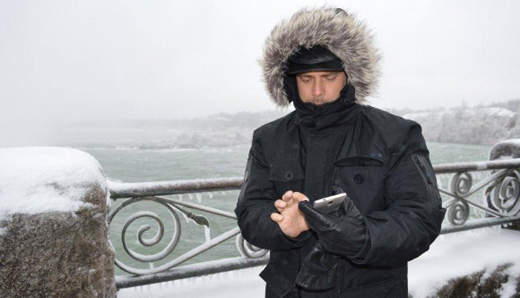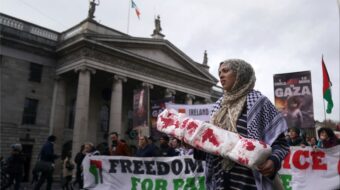
Gerardo Hernández was late in returning a call. This time he did reach Carlos Alberto Cremata in Cuba. He’s the director of La Colmenita, a well-traveled children’s theater group. Carlos Alberto in April 2012 had called Gerardo in prison in California to relay a message from the children, who were viewing Niagara Falls. “Gerardo, you’ll be coming home soon,” they said. This was no small prediction in view of Gerardo’s two life sentences.
Carlos Alberto’s father, Carlos Cremata Trujillo, worked for Cubana Airlines and was a spare time actor. He died in the 1976 terrorist attack off Barbados that brought down a fully-loaded Cubana airliner. CIA employee and current U.S. resident Luis Posada planned the sabotage.
When arrested in Florida in 1998, Hernández and four other Cuban agents were working precisely to prevent such terrorist attacks. The Cuban Five, as they became known, went free on December 17, 2014. Now they are touring in order to express thanks for worldwide solidarity on their behalf and to talk about what the Cuban Revolution means today in a crisis-filled world.
While Hernández was in Canada, his other Cuban Five comrades were also traveling; Ramón Labañino was in Uruguay and Argentina; and Antonio Guerrero was in Venezuela. Hernández gave presentations in Montreal, Niagara Falls, Fort Erie, Ottawa, Toronto, and Vancouver. The United Steelworkers Union (USW) sponsored his Canadian tour; he attended their national convention in Montreal.
Hernández told 200 listeners in Toronto that, “Ideas from abroad try to make capitalism before the 1959 revolution look like a paradise of sea and beaches, [but] this is not true. It was a system that killed and tortured its own people.” He recalled former U.S. insistence that negotiations with Cuba were impossible. Nevertheless, he noted, negotiations took place, and “Cuba hasn’t renounced one single principle … This is a huge victory for our leaders and people.”
Ramón Labañino attended a regional solidarity conference in Buenos Aires on April 9. Referring to political changes in Latin America, he noted that “We live in a complicated time. There is a strong attack against popular and progressive projects coming from soft blows.” He called for unity “of the various left forces and social and people’s movements in standing against that rightwing offensive supported by the North American government[sic].”
Labañino earlier had met with Argentinian intellectuals and artists, among them Stella Calloni, Vicente Batista, and Nobel Peace Prize recipient Adolfo Pérez Esquivel. He was there to express appreciation and to join in solidarity, he declared. Pérez Esquivel’s letters to Obama calling for freedom for the Five were recalled.
He also remarked that, “true Nobel Peace Prize winners would never abandon us.” Indeed, “We knew that the Revolution does not abandon its sons, because Fidel turned back the Granma [boat] to pick up a comrade who had fallen into the open ocean. And we knew the Granma would return for us, and today we are free.”
Ramon Labañino’s wife Elizabeth Palmeiro, accompanying him in Argentina, told members of Argentina’s Communist Party about her husband’s distress at being separated from his daughters. “But with the support of the people and leaders of Cuba and their backing we could get up each day and keep on moving ahead,” she declared.
In Uruguay, Ramon Labañino and Elizabeth Palmeiro visited with former Uruguayan President Jose Mujica in his home and attended other meetings. Now a senator, Mujica had repeatedly called upon the U. S. government to release the Cuban Five.
Meanwhile, Antonio Guerrero was in Venezuela attending the International Meeting of the “Artists’ and Intellectuals’ Network in Defense of Humanity.” On April 9 he warned against new communication systems operated “by the empire” and mass media that “destroy history and destroy young people’s power of analysis.” He called for “maintaining peace [and] stability [and protecting] the Bolivarian revolution, a peaceful revolution.”
Fernando González and René González, other former Cuban Five prisoners, are also reaching out to the worldwide movement that supported them as prisoners (and that backs Cuba now). Fernando serves as vice president of the Cuban Institute of Friendship with the Peoples. And since being released form prison in 2011, René has traveled the world on behalf of Cuba and peace.
In view of such efforts, attentive prison authorities might have observed that the Cuban Five, imprisoned, converted confinement into schools. With words, poetry, art, and their example, the Five in prison were teaching solidarity to the world. Prison experience became fodder for these Cuban revolutionaries now to be carrying their teaching to the far corners of the world.
Photo: Gerardo Hernández makes a phone call from Canada in 2016. | Courtesy of Cubadebate.cu.












Comments